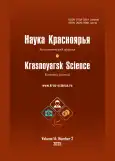Цифровые платформы для государственной поддержки олимпиадного процесса
- Авторы: Дьячкова А.В.1, Корнев Д.Е.1
-
Учреждения:
- Уральский федеральный университет имени первого Президента России Б. Н. Ельцина
- Выпуск: Том 14, № 2 (2025)
- Страницы: 47-64
- Раздел: Статьи
- Статья опубликована: 30.06.2025
- URL: https://journal-vniispk.ru/2070-7568/article/view/304199
- DOI: https://doi.org/10.12731/2070-7568-2025-14-2-293
- EDN: https://elibrary.ru/QKEAZF
- ID: 304199
Цитировать
Полный текст
Аннотация
Существующие государственные национальные и локальные цифровые сервисы фокусируются на административном управлении учебным процессом и фиксации личных достижений (электронные дневники) или отдельных аспектах олимпиадной деятельности. Архитектура решений ни одной из платформ не предусматривает комплексности, которая объединила бы академическую успеваемость, внеучебные достижения и персонализированную аналитику. Необходим новый цифровой продукт, сочетающий преимущества государственных систем (централизация данных) и нишевых сервисов (гибкость, ориентация на школьников), обеспечивая сквозной мониторинг образовательного трека.
Цель – сравнить функциональные возможности существующих цифровых решений с точки зрения их применимости для сопровождения олимпиадной деятельности и предложить ключевые требования эффективной архитектуры специализированной платформы.
Методология проведения работы: методы сопоставления и сравнения для выявления сильных и слабых сторон цифровых платформ.
Результаты. Сформулированы ключевые функциональные требования к архитектуре решений по сопровождению олимпиадного процесса: 1) модуль учета и аналитики достижений с фиксацией, систематизацией и визуализацией результатов; 2) развитый календарно-событийный функционал; 3) двусторонний обмен данными; 4) многофункциональная коммуникация; 5) модуль персонализированных рекомендаций, основанный на анализе больших данных, выявляющий слабые темы и предлагающий оптимальную стратегию участия в олимпиадах, построенный на основе технологий искусственного интеллекта и машинного обучения.
Область применения результатов. Основные черты архитектуры цифровой платформы олимпиадного процесса могут быть использованы для интегрирования в электронный дневник национальной информационной системы, портал Госуслуг.
Об авторах
Анна Викторовна Дьячкова
Уральский федеральный университет имени первого Президента России Б. Н. Ельцина
Автор, ответственный за переписку.
Email: a.v.diachkova@urfu.ru
ORCID iD: 0000-0003-4970-1820
SPIN-код: 2572-3857
Scopus Author ID: 57211156711
доцент кафедры «Экономической теории и экономической политики», кандидат экономических наук
Россия, ул. Мира, 19, г. Екатеринбург, Свердловская область, 620062, Российская Федерация
Дмитрий Евгеньевич Корнев
Уральский федеральный университет имени первого Президента России Б. Н. Ельцина
Email: Kornev.Dmitry@urfu.me
ORCID iD: 0009-0009-7114-2149
магистр по направлению «Программная инженерия»
Россия, ул. Мира, 19, г. Екатеринбург, Свердловская область, 620062, Российская Федерация
Список литературы
- Ахметжанова, Г. В., & Юрьев, А. В. (2018). Цифровые технологии в образовании. Балтийский гуманитарный журнал, 7(3), 334–336.
- Бережная, Л. В. (2016). Электронный дневник как инструмент повышения качества образования. Качество современного образования: опыт, тенденции развития, с. 197–200.
- Близнюк, И. А., & Капитонова, Т. А. (2016). Электронный журнал и электронный дневник как средства интерактивного взаимодействия между участниками образовательных отношений в начальной школе. Образовательные и воспитательные стратегии в современном обществе, с. 5–9.
- Боровик, В. Г. (2013). Электронный классный журнал, школьный дневник, учебники: проблемы и перспективы. Народное образование, (1), 99–103.
- Вифлеемский, А. Б. (2013). Государственные (муниципальные) услуги и «Дневник.ру». Народное образование, (9), 41–48.
- Волкова, Е. Н., Микляева, А. В., & Самойлов, О. М. (2024). Как использование электронного дневника влияет на формирование навыков саморегулируемого обучения? Результаты эмпирического исследования. Цифровая гуманитаристика и технологии в образовании (DHTE 2024), с. 55–66.
- Ефимова, Г. З., & Семенов, М. Ю. (2017). Электронные дневники и журналы в школе в оценках учителей. Информационное общество, (6), 54–60.
- Жуковская, И. Е. (2022). Цифровые платформы — важный аспект цифровизации высшего образования. Открытое образование, 26(4), 30–40. https://doi.org/10.21686/1818-4243-2022-4-31-40 EDN: https://elibrary.ru/VFJZWS
- Калимуллина, О. В., & Троценко, И. В. (2018). Современные цифровые образовательные инструменты и цифровая компетентность: анализ существующих проблем и тенденций. Открытое образование, 22(3), 61–73. https://doi.org/10.21686/1818-4243-2018-3-61-73 EDN: https://elibrary.ru/XQZQWD
- Корнеева, Н. Ю., Уварина, Н. В., & Корнеев, Д. Н. (2022). Применение цифровых образовательных платформ в организациях профессионального образования. Педагогическое образование, 3(6), 118.
- Петров, Д. В. (2016). Электронный дневник как способ контроля за процессом обучения. Оригинальные исследования, (2), 38–43.
- Храмов, А. А. (2015). Электронный дневник как технология контроля за процессом обучения учащихся средних классов. Информационно-измерительные и управляющие системы, 13(10), 74–78.
- Чуйко, О. И., & Ещенко, Р. А. (2014). Электронный журнал: анализ применения в школах и перспективы внедрения в вузах. Международный академический вестник, (6), 27–31.
- Якублевич, Р. А. (2024). Электронный дневник самоконтроля. В кн.: Беларусь в современном мире: материалы XVII Междунар. науч. конф. студентов, магистрантов, аспирантов и молодых учёных, Гомель, 23–24 мая 2024 г. (ч. 2, с. 264–267). Гомель: ГГТУ им. П. О. Сухого.
- Якушина, Е. В., Буланов, С. В., & Гаврилин, И. А. (2010). Электронный журнал и виртуальный дневник ученика: варианты, преимущества и недостатки информационных систем. Народное образование, (6), 226–234.
- Якушина, Е. В., Буланов, С. В., & Гаврилин, И. А. (2010). Электронный журнал и виртуальный дневник ученика: комплексная информационная система для современной школы. Школьные технологии, (4), 65–72.
- Яникова, З. М., Вечирко, Т. А., & Чернецкая, Т. А. (2012). Методические рекомендации по внедрению комплексной системы «электронные журнал и дневник». Информатика и образование, (6), 13–16.
- Ashcroft, M. (2024). Using study diaries with lower proficiency ESOL learners. Language Issues: The ESOL Journal, 35(2), 20–24.
- Dignath-van Ewijk, C., Fabriz, S., & Büttner, G. (2015). Fostering self-regulated learning among students by means of an electronic learning diary: A training experiment. Journal of Cognitive Education and Psychology, 14(1), 77–97.
- Gogh, E., Kovacs, A., & Szildi, G. (2017). Application of E-diary to analyze the effectiveness of learning. 2017 8th IEEE International Conference on Cognitive Infocommunications (CogInfoCom). IEEE, 000419–000424.
- Hallett, D. L. (2017). Investigating the use of a digital diary for home-school communication between parents and teachers of children with additional needs.
- Joseph-Edwards, A. (2019). The effect of standardized learning diaries on self-regulated learning, calibration accuracy and academic achievement (дис.). Old Dominion University.
- Orhani, S., Saramati, E., & Drini, L. (2022). Electronic school diary for statistical analysis of student progress. Brazilian Journal of Science, 1(3), 58–65. https://doi.org/10.14295/bjs.v1i3.89 EDN: https://elibrary.ru/CFZOJL
- Puspita, D., Nuansa, S., & Mentari, A. T. (2021). Students' perception toward the use of Google Site as English academic diary. Community Development Journal: Jurnal Pengabdian Masyarakat, 2(2), 494–498. https://doi.org/10.31004/cdj.v2i2.1980 EDN: https://elibrary.ru/ZDKWXN
- Yan, Z., Chiu, M. M., & Ko, P. Y. (2020). Effects of self-assessment diaries on academic achievement, self-regulation, and motivation. Assessment in Education: Principles, Policy & Practice, 27(5), 562–583. https://doi.org/10.1080/0969594x.2020.1827221 EDN: https://elibrary.ru/WBMPYK
Дополнительные файлы










